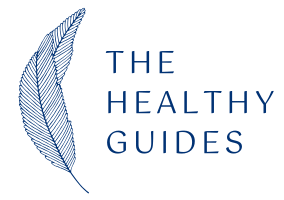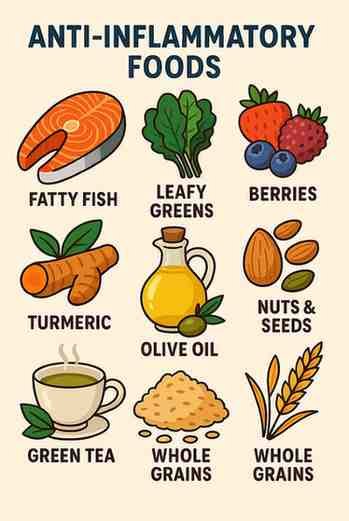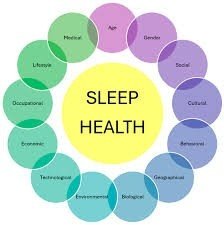Are Anti-Inflammatory Foods Scientifically Proven?
The Complete Guide to Diet, Foods, and Lifestyle for Reducing Inflammation
Walk into any grocery store or scroll through wellness TikTok, and you’ll find endless talk of “anti-inflammatory foods.” Golden turmeric lattes, kale smoothies, salmon bowls—it feels like inflammation has become the villain of modern health.
But here’s the real question: Are anti-inflammatory foods scientifically proven, or is it just another marketing buzzword?
The short answer: yes, science backs them—but it’s not about one magical food. It’s about an overall eating pattern that supports your body’s natural healing process. In this guide, we’ll explore the science of inflammation, the best foods (and worst offenders), myth-busting facts, and even a full 7-day anti-inflammatory meal plan for beginners.
What Is Inflammation?
Think of inflammation as your body’s built-in fire alarm.
- Acute inflammation → Good. Short-term response to injury or infection. Example: redness and swelling after a cut.
- Chronic inflammation → Bad. The alarm keeps blaring even when there’s no fire. Over time, it damages tissues and raises your risk of heart disease, diabetes, arthritis, depression, and gut issues.
That’s where anti-inflammatory foods come in: they can turn down the alarm and support healing.
Do Anti-Inflammatory Diets Really Work?
The evidence says yes. Studies consistently show that diets rich in fruits, vegetables, whole grains, nuts, legumes, and fatty fish reduce markers of inflammation like C-reactive protein (CRP).
Some of the best evidence-based diets include:
- Mediterranean Diet → Rich in olive oil, fish, whole grains, vegetables, and nuts. Linked to lower inflammation and reduced risk of chronic disease.
- DASH Diet → Designed for blood pressure but also reduces inflammation markers.
- Plant-Based Diets → High in antioxidants, fiber, and phytochemicals, which support gut health and reduce systemic inflammation.
💡 Takeaway: It’s not about a single “superfood.” It’s about a pattern of eating that consistently nourishes your body.
The Best Anti-Inflammatory Diet Meal Plan for Beginners
Here’s a simple one-day starter plan to show what it looks like in practice:
- Breakfast: Overnight oats with blueberries, chia seeds, and walnuts
- Lunch: Quinoa salad with chickpeas, kale, olive oil, and lemon
- Snack: Green tea + handful of almonds
- Dinner: Grilled salmon, roasted sweet potatoes, and steamed broccoli
- Treat: A small square of dark chocolate (70% or higher)
👉 Tip: Start small. Swap soda for green tea, or replace refined carbs with whole grains. Little changes compound into big benefits.
Top Anti-Inflammatory Foods for Arthritis and Joint Pain
If you deal with joint stiffness, swelling, or arthritis, food can be a powerful ally. These are the MVPs:
- Fatty Fish (salmon, sardines, mackerel): Omega-3s reduce joint pain and stiffness.
- Olive Oil: Rich in oleocanthal, which acts like a natural ibuprofen.
- Berries (blueberries, raspberries): Packed with anthocyanins that fight oxidative stress.
- Leafy Greens (kale, spinach): High in vitamin K, which supports bone and cartilage health.
- Nuts & Seeds: Provide magnesium and healthy fats to calm inflammation.
7-Day Anti-Inflammatory Meal Prep Plan
Consistency is everything. Here’s a beginner-friendly weekly plan you can batch-prep:
Day 1–2:
- Grilled salmon with roasted veggies & quinoa
- Overnight oats with chia seeds & berries
Day 3–4:
- Lentil and turmeric soup with whole grain bread
- Chickpea and kale salad with lemon-olive oil dressing
Day 5:
- Grilled chicken with turmeric-spiced brown rice
- Snack: Yogurt with flaxseeds and raspberries
Day 6:
- Sardine avocado toast on whole grain bread
- Side: Green tea + almonds
Day 7:
- Buddha bowl with quinoa, roasted sweet potatoes, leafy greens, and tahini dressing
- Treat: Dark chocolate + chamomile tea
✅ Pro tip: Roast a big tray of mixed veggies and cook extra grains on Sunday. Store in glass containers for quick mix-and-match meals.
Turmeric vs. Ibuprofen for Inflammation
Turmeric (specifically its active compound, curcumin) has become the poster child of anti-inflammatory foods.
- Curcumin: Works by blocking NF-kB, a molecule that drives inflammation. Best absorbed with black pepper (piperine).
- Ibuprofen: Provides rapid relief for acute pain but can cause side effects like stomach irritation with long-term use.
💡 Verdict: Turmeric isn’t a replacement for ibuprofen in emergencies, but it can be part of a daily anti-inflammatory lifestyle to reduce long-term inflammation.
How to Use Ginger as a Powerful Anti-Inflammatory
Ginger contains gingerols and shogaols, which target inflammatory pathways.
Ways to use it:
- Fresh ginger tea for bloating or digestion
- Grated into stir-fries, soups, or curries
- Blended into smoothies with turmeric and lemon
- As a natural remedy for nausea, especially useful in pregnancy
Anti-Inflammatory Foods for Gut Health and Bloating
Since 70% of your immune system lives in your gut, a happy gut = lower inflammation.
Best gut-friendly foods:
- Fermented foods: Yogurt, kefir, sauerkraut, kimchi (boost good bacteria)
- High-fiber foods: Oats, beans, lentils (feed your microbiome)
- Polyphenol-rich foods: Green tea, berries, olive oil (fight oxidative stress)
👉 Bonus: These same foods help reduce bloating naturally.
Easy Anti-Inflammatory Smoothie Recipes for Beginners
Smoothies are a quick way to pack in nutrients. Try these combos:
- Berry Blast Smoothie
- Blueberries, spinach, almond milk, chia seeds
- Golden Glow Smoothie
- Banana, turmeric, ginger, black pepper, coconut milk
- Green Gut-Healer Smoothie
- Kale, cucumber, pineapple, flaxseeds, kefir
Worst Inflammatory Foods to Avoid Immediately
Certain foods act like gasoline on the inflammation fire:
- Refined sugar (soda, pastries, candy)
- Fried foods (fries, fried chicken)
- Processed meats (bacon, hot dogs, sausages)
- Trans fats (partially hydrogenated oils)
- Refined carbs (white bread, pasta, pastries)
👉 Limit these as much as possible—your joints, gut, and heart will thank you.
Myth-Busting: Common Misconceptions
- ❌ Myth 1: One superfood can fix everything.
Reality: Diet patterns matter more than single foods. - ❌ Myth 2: All inflammation is bad.
Reality: Acute inflammation heals. It’s chronic inflammation we want to calm. - ❌ Myth 3: Supplements beat food.
Reality: While fish oil or curcumin supplements help, whole foods offer synergy you can’t bottle.
Conclusion: Are Anti-Inflammatory Foods Real?
The verdict: Yes, anti-inflammatory foods are real and scientifically proven.
But they’re not magic bullets—they work best as part of a sustainable, whole-food eating pattern. Think more berries, greens, olive oil, fish, ginger, and turmeric; fewer sodas, fried foods, and processed meats.
The exciting part? These changes don’t just lower inflammation—they boost energy, support gut health, protect your heart, and even ease arthritis symptoms.
Start small. Add a handful of spinach to your smoothie. Swap soda for green tea. Snack on nuts instead of chips. Over time, those little steps will lead to big, lasting wins for your health.
Perfect idea 🙌—an FAQ section will make this article even stronger, more scannable, and SEO-friendly. Here’s an expanded FAQ block you can plug at the end of your guide:
? Frequently Asked Questions
1. Are anti-inflammatory foods really proven by science?
Yes. Research shows diets rich in fruits, vegetables, whole grains, nuts, legumes, and fatty fish reduce inflammatory markers like C-reactive protein (CRP) and interleukin-6 (IL-6).
2. What is the #1 anti-inflammatory food?
There isn’t a single “#1” food. But fatty fish (like salmon), berries, olive oil, and leafy greens are among the most effective. It’s about the overall pattern, not one superfood.
3. Can anti-inflammatory diets help arthritis and joint pain?
Yes. Omega-3-rich fish, olive oil, and antioxidant-rich foods have been shown to reduce stiffness and swelling in arthritis patients.
4. Is turmeric better than ibuprofen for inflammation?
Not exactly. Ibuprofen works faster for acute pain, while turmeric (curcumin) supports long-term inflammation control when consumed regularly with food.
5. How long does it take to see results from an anti-inflammatory diet?
It varies. Some people notice changes like reduced bloating and better energy in a few weeks. For joint pain or chronic conditions, benefits may take 2–3 months of consistency.
6. Do anti-inflammatory foods help with weight loss?
Yes. These foods are typically nutrient-dense, high in fiber, and lower in processed sugar and unhealthy fats. They keep you fuller for longer and support healthy metabolism.
7. Can kids follow an anti-inflammatory diet?
Absolutely. A diet rich in fruits, veggies, whole grains, and fish supports growth, brain development, and long-term health.
8. Are smoothies a good way to eat anti-inflammatory foods?
Yes! Smoothies make it easy to blend antioxidant-rich fruits, leafy greens, ginger, and turmeric into one meal. Just avoid adding too much sugar.
9. Which foods should I avoid to lower inflammation?
Refined sugar, fried foods, processed meats, refined carbs, and trans fats are the biggest culprits. Limit them as much as possible.
10. Is coffee anti-inflammatory?
In moderation, yes. Coffee contains polyphenols that have anti-inflammatory properties. But too much caffeine can disrupt sleep and raise stress, which increases inflammation.
11. Can an anti-inflammatory diet improve gut health?
Yes. High-fiber foods, fermented foods (like yogurt and kimchi), and polyphenol-rich foods (like green tea and berries) support gut bacteria that lower systemic inflammation.
12. Do I need supplements like fish oil or curcumin?
Supplements can help if your diet is lacking, but whole foods are the better first choice. They provide a combination of nutrients that work together more effectively.
If you’re curious about how brown rice compares to other types of rice, check out our full guide on ”wheat vs white bread“
High protein breakfasts aren’t just good for your body—they also stabilize mood and energy, reducing anxiety crashes later in the day. Learn more in our Mental Health section.
Did you know that what you eat in the morning can affect sleep quality at night? A balanced breakfast supports stable circadian rhythms—discover more in our Sleep Health articles.
For more tips and support, visit our Facebook page.







